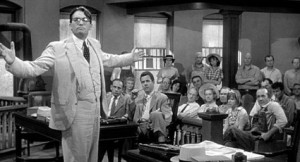The Facts Examined
If you’ll remember, the trial was of a black man accused of raping a white girl. The setting was the rural south during segregation. The facts showed that it was highly unlikely, downright impossible even, that the accused, Tom Robinson, could have done what he was on trial for and that quite possibly the act itself (the rape) never even occurred. That what had occurred was that this poor white girl, starved for attention, had tempted a young black man, kissed him, and was beaten savagely by her father as punishment.
Council for the defense presented his argument convincingly to demonstrate that something was amiss…something was wrong with the picture that the state had portrayed in its prosecution.
It is often in life that we come across such anomalies. Things that just don’t seem right. So, we examine the facts. And to do so effectively, sometimes we must step outside the setting, or context…because “the setting” is often like a smoke-filled room where the haze and stench make it very difficult to achieve any sense of clarity.
Sometimes that “setting” really only exists in our own air-tight minds…
The Principle Applied
The principle was equal justice. For that jury to do something against their nature…to remove impact blinders and try Tom Robinson fairly based on the facts, rather than prejudicial-ly based on pre-conceived and hate-inspired notions.
It’s difficult to judge impartially…solely based on the facts. Because we see the world through a prism that all too often mis-directs our focus towards pre-conceived notions of the way things are supposed to be, or the way we were told they’re supposed to be, or maybe even the way we wish they were.
When in reality, they aren’t at all.
The Impact Demanded
Atticus implored, impact-fully, that in the name of god no less, the jury must do its duty. And what was that duty? To judge impartially based on the facts alone, which in this case led to the obvious conclusion that the man, despite his color (the only real “fact” that he was on trial for), was not guilty. To be color-blind deliberators and freedom liberators. It was an inspiring duty to say the least. But it was a duty that placed too heavy a burden on this jury, in that hazy and stench-filled setting.
Basically, the duty implored was to do the right thing.
And to prioritize that impact (that duty) over secondary interests…such as aspiration, accumulation and amplification of ego.
And to clear away the fog of certain “blinders” that cause us to screen out essential elements of truth.
To be color-blind deliberators and freedom liberators…as well as inspiration instigators.
The Atticus Argument provides our therapeutic metaphor for doing no less…
